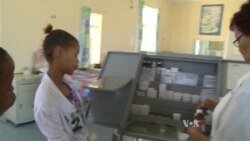With the discovery in China of bacteria that have developed resisistance to all known antibiotic medicines, scientists are warning that an "antibiotic apocalypse" may be a step closer.
A report on the bacteria, published in The Lancet, a medical journal, prompted Chinese authorities to consider banning the use of some antibiotics in animals.
The bacteria in China, found in pigs, were resistant to even the strongest of antibiotics, a medicine called colistin. Fifteen percent of raw meat samples tested — and 16 human patients — were infected.
Dr. Peter Barlow of Scotland's Edinburgh Napier University, who has worked at the U.S. Centers for Disease Control and Prevention, told VOA that "it's actually the use of this antibiotic in livestock that’s promoted this. And because antibiotics are used so widely in livestock and in humans, it’s got us to the stage where we’re facing a problem with antibiotic resistance in a lot of different types of bacteria."
Chinese scientists have identified a genetic mutation known as MCR-1 that provides the antibiotic resistance — and it can easily spread across different species of bacteria. Evidence of resistant strains of bacteria have also been found in Laos and Malaysia, scientists said.
Margaret Chan, director general of the World Health Organization, this week joined the chorus of warnings.
“The world is heading toward a post-antibiotics era in which common infections will once again kill," she said. "If current trends continue, sophisticated interventions like organ transplantation, joint replacement, cancer chemotherapy and care of preterm infants will become more difficult or even too dangerous to undertake."
Barlow said urgent action was needed to avert such a catastrophe.
“We need a really effective global strategy for dealing with antibiotic use, both in humans and in livestock," he said. "And I think we need increased and sustained investment in antibiotic drug discovery."





